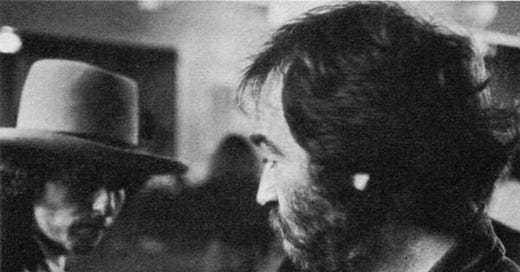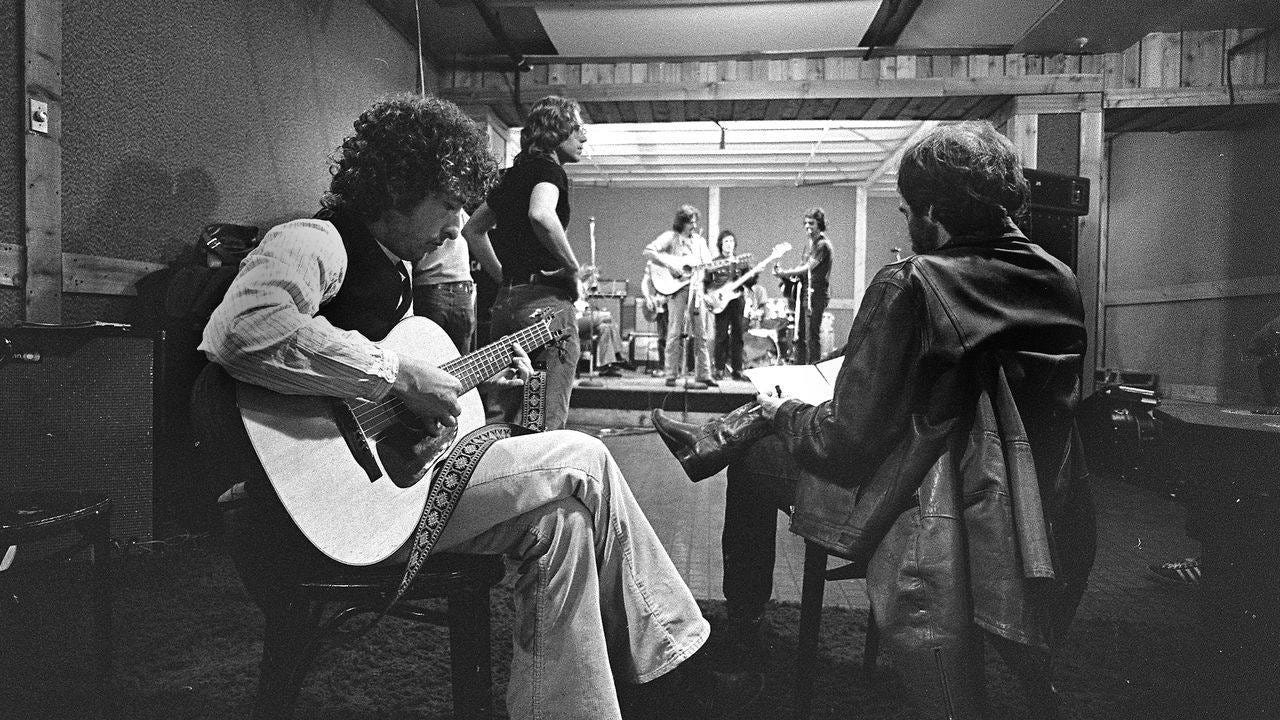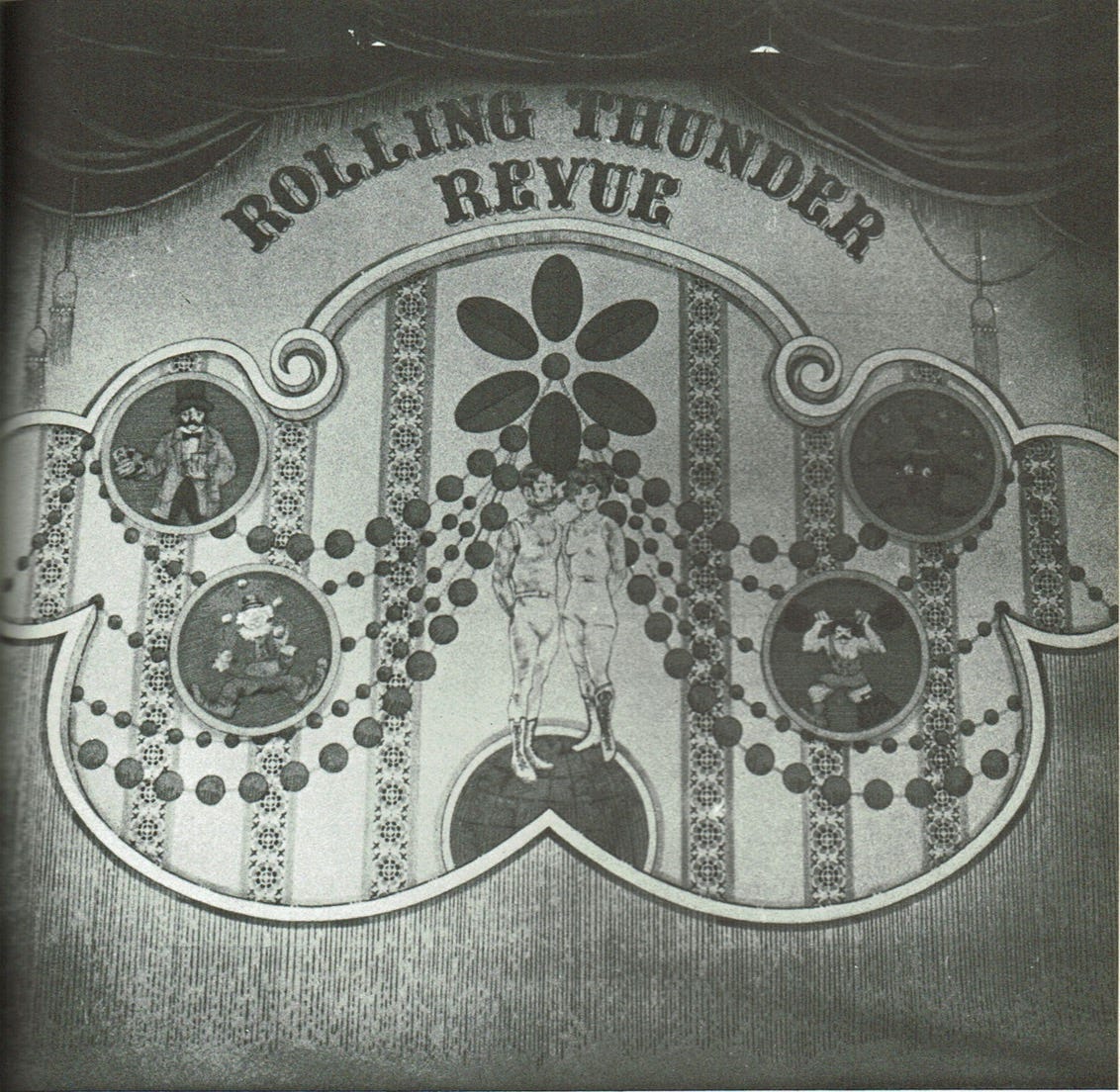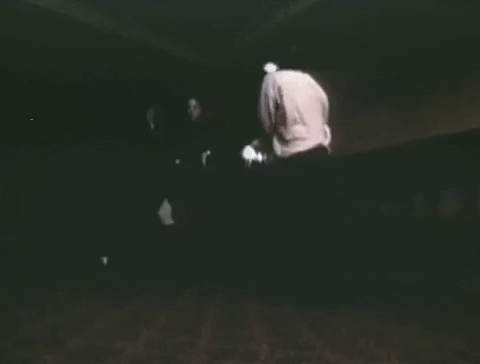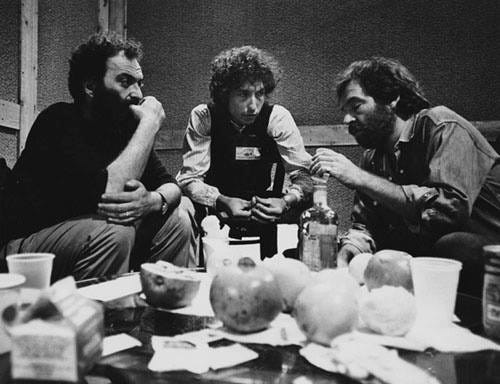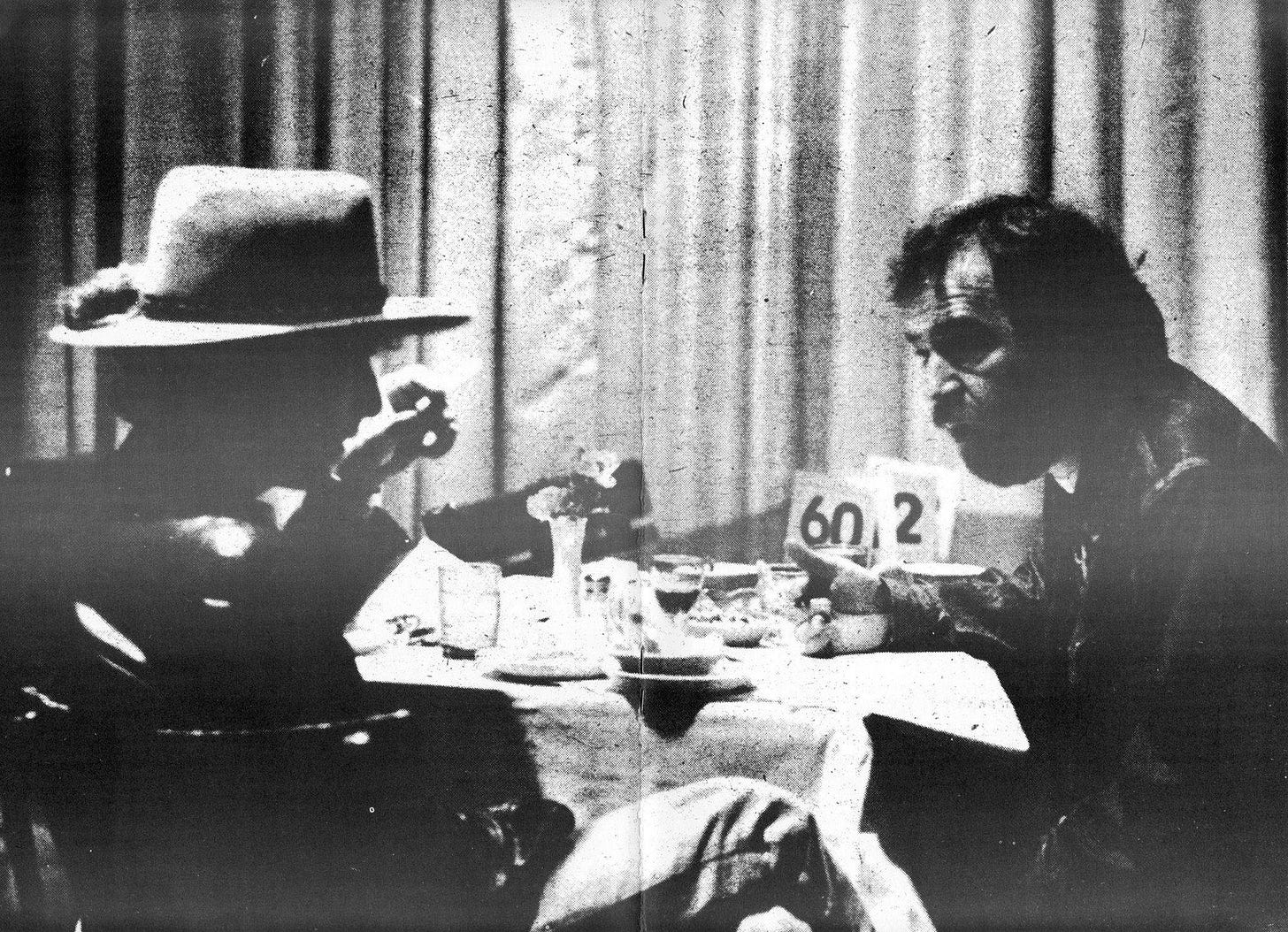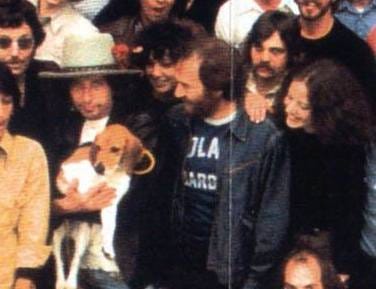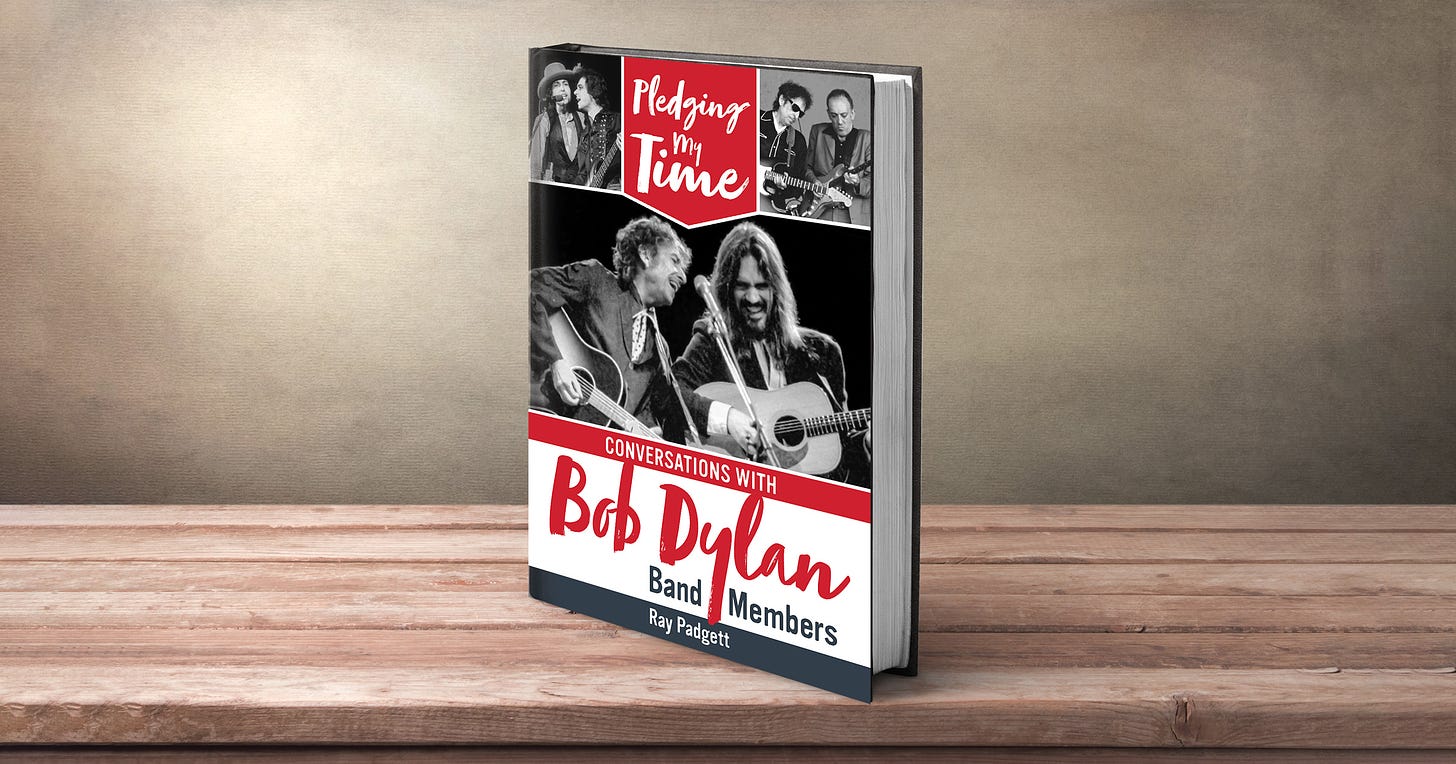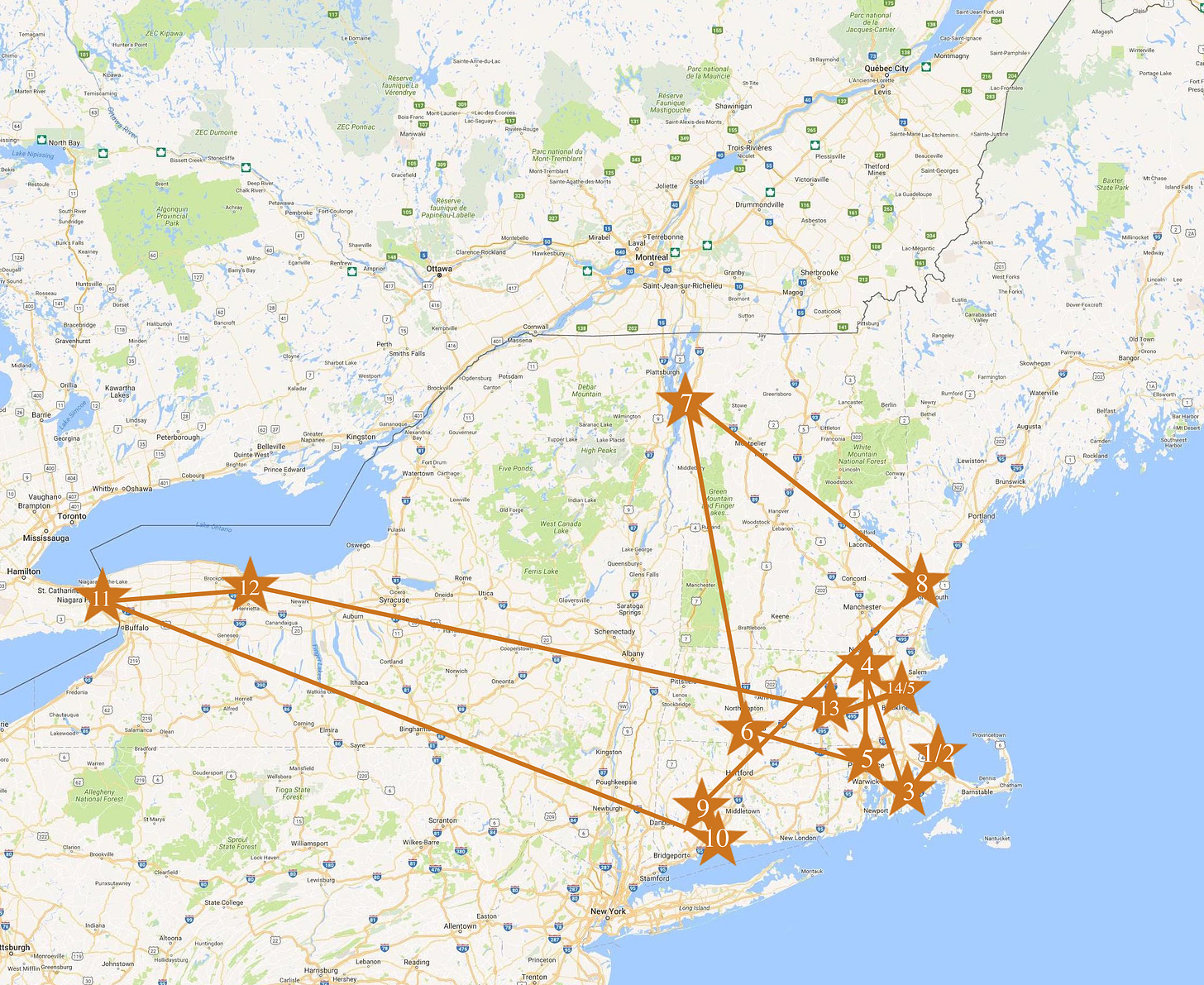Jacques Levy's Wife Explains the Late Director's Role on Rolling Thunder
1975-11-21, Music Hall, Boston, MA
Flagging Down the Double E’s is an email newsletter exploring Dylan shows of yesteryear. I’m currently writing about every show on the Rolling Thunder Revue. If you found this article online or someone forwarded you the email, subscribe here to get a new entry delivered to your inbox every week:
Update June 2023: This interview is included along with 40+ others in my new book ‘Pledging My Time: Conversations with Bob Dylan Band Members.’ Buy it in hardcover, paperback, or ebook here!
Like most Dylan fans, I knew Jacques Levy primarily for his role co-writing most of Desire with Bob. I hadn’t realized how involved he was with the Rolling Thunder tour until I started talking to the band members. I kept hearing, “Jacques suggested I do this” or “Jacques set up this way.” Jacques was the tour’s director, and I was curious what precisely that job entailed. So I was thrilled to get an email recently from his wife Claudia. Turns out not only was she married to him up until his death in 2004, but they had met just before Rolling Thunder - introduced by their mutual friend Bob Dylan, no less - and she accompanied Jacques on the entire tour.
Here’s my conversation with Claudia Levy:
Let's start at the beginning. Can you tell me how you met Jacques?
I first met Jacques in the grocery store. He tried to pick me up, and every line he gave me I thought was totally ridiculous. I don't know why I gave him my phone number. He called me a number of times, but I wasn't going to go out with him. It was a non-starter.
[Soon after,] I met Bob in the Dante Café, where I was working as a waitress, in late May, early June of ‘75. When he came in, I didn't recognize him. I said, “You look very familiar to me. Are you a dancer?” Because I had studied dance and I had been involved with a lot of dancers. He thought that was very funny. I could see he was writing and it looked to me like he was like writing poetry or something. My graduate degree was poetry, so I said, “Oh, are you a poet”? He said, “Well, I like to write.”
So we talked a lot about poetry. He asked me what I did, and I said I was going to go study painting at the Brooklyn Museum school. He said, “Don't do that. Don't go there. You go study with this guy, and he'll change your life.” And he sent me to Norman Raeben. He had been Bob’s teacher, and then he became my teacher.
I spoke to Bob for a couple of days. It was the afternoon, there weren’t a lot of people around. I guess it was the third day he was sitting there, the light was coming in in a certain way and you could see the light through his hair. I felt this thing like, "Oh my God. I've just been sitting here casually chatting with Bob Dylan!" I was so flustered. I said to him, “I know who you are.” And he said to me, "Does that mean you're not going to talk to me anymore?" Which was the perfect thing to say.
So we became friendly and he invited me to come to the Other End, because he thought he would be playing there. He came in with Jacques and he re-introduced me to Jacques. And that was it.
Did you recognize Jacques immediately from the grocery store?
Yes. He had said to me at the store, "Don't I know you from somewhere?," which I thought was a stupid line. So I said to him at the Other End, "Don't I know you from somewhere?" Bob told me that they'd been working together and that they were going to go out to East Hampton. I said to Bob, “You know that Jacques Levy? I really like him. Could you tell him to call me when you get back?”
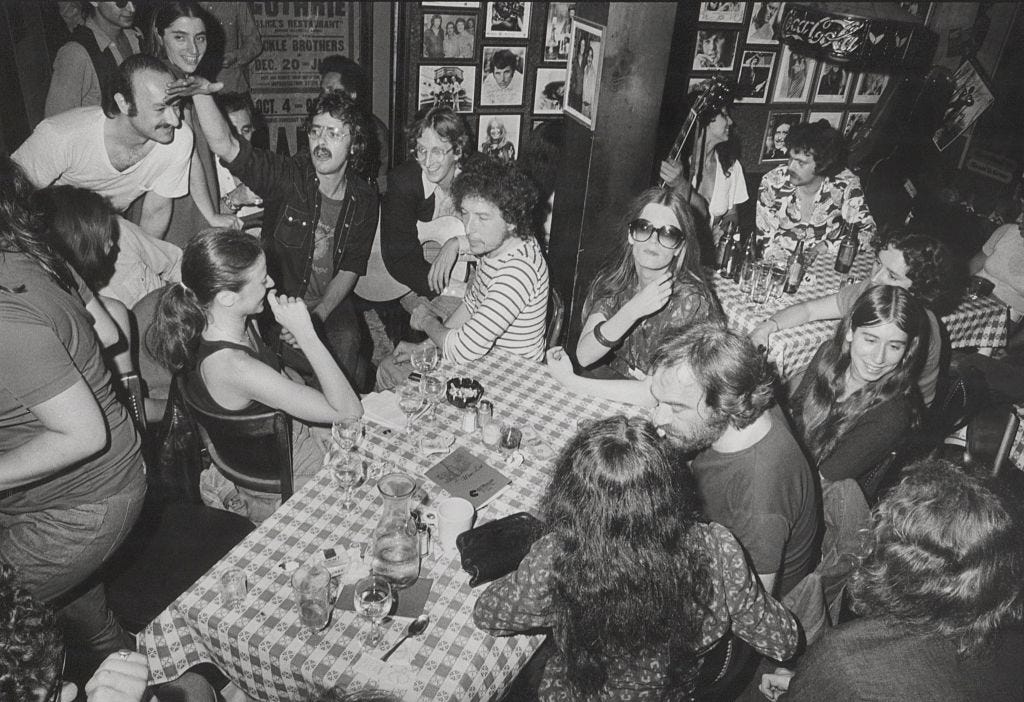
They were gone for a month and then Jacques called me and said they were going to be going to CBS to record songs and did I want to come? I said yes. When I came in, Emmylou was singing "Oh, Sister." I will never forget that. She was amazing. I went to maybe three of those recording sessions with Jacques. It became clear very quickly that something was afoot between us. So when they decided that they were going to go on tour, Jacques asked Bob if I could come along. Since I was friendly with Bob, Bob said sure.
Can you tell me more about Jacques’ work as the director of the show?
Jacques was a man of the theater and they would do these bus and truck tours. He suggested that idea to Bob. Bob loved it.
Jacques' idea was that it was going to be a show, not a rock and roll tour. Each musician had a chance to show their stuff. Everyone that was someone had a chance to do that - including Neuwirth, who as you probably know, is not a great singer, but he gave him a chance. It was very important for Jacques that each musician have their moment. It was them as a band performing. It wasn't just Bob Dylan.
He staged everything. He had Bob come out and not sing right away, but walk through the band as they were performing. People would go "Oh my god, is that Bob Dylan? Is that Bob?" Then he had Bob and Joan sitting in chairs across from each other, with the lights down on them. Then they started to sing and of course everybody went crazy, because you would see that it's Bob and Joan.
There was a curtain too right? Like dramatically raised to reveal them…
Yes, it was an old fashioned rolled curtain that Jacques had. That would roll up and they would be on the stage. It was like theater with the lights on Bob and Joan singing together. They would start to sing together and then that would roll up.
Bob had to act those songs and of course Jacques helped him. I know that Patti Smith takes credit for it, but it was Jacques who helped him act the songs where he didn't have a guitar. Jacques coached him 'til early in the morning.
Did you know anyone else on the tour?
The only person that I knew was Jack Elliott. It’s kind of a crazy story. Jack was in love with a woman that I was friends with. I was going to graduate school in Buffalo, New York and became friends with this woman named Gilma Lee. She had been with Jack in Japan and she had ended their romance. I was hanging out with Gilma a lot. He would call and she would say, “I'm not talking to Jack, so you answer the phone.” Well, as you probably know, Ramblin' Jack is named Ramblin' Jack not because he moved around a lot. It's because he talks a lot. You talk to Ramblin' Jack and you can be easily on the phone for an hour. So we would talk. He asked me about myself. He would try to get me to persuade Gilma Lee to talk to him.
I had met Allen Ginsberg in California very briefly. Jacques knew Allen from Chicago because he was friends with Abbie Hoffman and had been involved at the trial of the Chicago Seven. He and Allen got along quite well, but he didn't love it when Allen would perform with his harmonium during Rolling Thunder. He thought he had to be taken off of the stage. I mean, you couldn't help but love Allen, but it would take the temperature down of the performance.
I'm in the end of Renaldo and Clara with Allen. I had been studying dance and I told Allen that I was going to teach him how to do the jitterbug. There’s a shot me dancing after Ronee Blakley leaves. Ronee is doing this kind of interpretive dance and I'm just doing a different kind of dancing at the end there. Bob gave me a credit; it was so sweet he put it in. But Allen wasn't interested in learning the jitterbug.
What was day-to-day life like on the road for you?
For the first few stops, we went around and put signs on lampposts to advertise. People would say to me, “Yeah, right. Bob Dylan isn't going to come here and play the Opera House” or whatever. And I’d say, “Well, why don't you go and find out?” In the Scorsese film, you can see how surprised people were that Bob Dylan was coming into town. You could also see the performances that Bob gave at that time were unbelievable. They could send chills up your spine. I saw every single show all the time we were on the road. I have seen Bob many times since, but I've never seen him be better than he was on Rolling Thunder.
The thing is, I was basically quite extraneous. I just watched everybody more than anything. I was having the time of my life. You know, these people became my friends. T-Bone and Mick, we spent a lot of time together. Howie was one of the sweetest people who ever was. You're doing a show, you get to be friends like that. I can't tell you how lovely they were. Each and every one of them. I mean, I just adored them. I wanted them to be my family. They were, in a way.
The only person I didn't really get along with, to tell you the truth, was Neuwirth. He gave me kind of a hard time, like I was a groupie or something. I could understand in a way, because there are a lot of things that happen with musicians and girls on tour. But I certainly wasn't one of them. I was coming from a whole different world, and I didn't like the way he cast me as a character. He was very dismissive of me. I think he was one of the few people that Jacques really didn't cotton to. He knew Jacques from before, because he had known Jacques's prior girlfriend. That had nothing to do with me; I wasn't even in New York at the time. Jacques could deal with anybody, but he was the only one that I felt there was any kind of tension.
I know Jacques arranged and choreographed the whole thing in advance, but what work was he doing on the road? Especially after it had been rolling a week or two.
He worked all the time. I hardly saw my future husband during the tour. He would always listen to the show. From the theater, Jacques knew a lot about sound systems, so he would sit at the board with the sound people. It was always a different venue, so you have to make sure that the sound is right, you got to make sure that the lighting is right. It's like any director in the theater. He would watch the show and see how it was going and see if anything needed to be tweaked. He would make the band rehearse if he thought they were not up to snuff. On the second tour, Neuwirth even printed a T-shirt for everyone that said "The I Hate Jacques Levy Fan Club.”
He wanted to keep the performances crisp. Jacques hated when you would go to a rock and roll show and you'd have to wait for them to set up [between acts]. That never happened on Rolling Thunder. When the curtain opened on the band, it was like a theatrical opening of the show and they started playing right away. You didn't want people plugging in and setting up. Only once did that happen, in New Orleans on the second tour, which was really scary. They were playing an old place where they used to do cattle auctions. It was a big round wooden structure with a high ceiling and something happened with the sound system. It wasn't working right. So they were delayed, a lot. People were getting very restless. And, you know, the North is Bob's territory. The South, not as much. They weren't as patient with having to wait. They were stamping and shouting.
Dennis Hopper was there. And Dennis thought the world of himself. He decided that he was going to read a poem and calm everybody down. Jacques was trying to dissuade him from doing that, but Dennis insisted that it was going to change the whole temperature of the place. And he did it. By the time he was done, we were really scared. The place was shaking. Really literally shaking.
Jacques didn't ruffle. He was not a man who lost his temper or raised his voice. He could figure out how to deal with whatever issues there might be. And he knew that if you had to counter any kind of restiveness, you send out Roger, ‘cause he could do it. So Jacques said to McGuinn, “Okay, Roger, hit the beaches.” And Roger went out and started playing “Eight Miles High.” That did the trick.
Roger and Jacques were really great friends, because they had worked together before Jacques knew Bob. Roger came when Jacques was dying and stayed with him ‘til the day that he died. He loved him; it was a wonderful thing. He sang every song they ever wrote to Jacques when he was dying.
What was Jacques’ role on the second half of the tour?
Same kind of thing. That’s when he would make the band really rehearse, because the venues were so much larger and because new people were coming in. [In Texas,] Willie Nelson came in with his own crew and his sister. He was terribly sweet, but he wanted what he wanted and how he wanted it. He brought in his sister and her piano and his band, so they had to figure out a way to accommodate that.
Pretty much everyone I've talked to says that the vibe was not as good on the second tour. Was that your and Jacques' experience as well?
Yes, definitely. The first part of the tour was unbelievable. It was idyllic. It was romantic. We were all having a wonderful time, and Bob was very happy. The second part of the tour, he was like a different person. I mean, he was great on stage. There was no point in time that he wasn't really good. But he wasn't a happy camper. You know, everything starts at the top, and it filters through. And that was the case on the second tour.
The first part of the tour, there were no drugs. People weren't doing coke or anything like that. The second part of the tour-- I know Mick was drinking more. There was a different color to things, if you will. There was a kind of tension.
Last year your son Julien wrote an article for Vice taking issue with how Scorsese’s documentary erased Jacques from the narrative by adding a fictional filmmaker. Can you tell me what you thought?
They invited [my son and I] to this private screening and both of us were sitting there totally freaked out. I was so upset that he didn't give Jacques credit. I was beside myself. I spoke to the woman who was the producer and the editor. I think by that time, it was set and nothing could be changed. I wanted to talk to Scorsese, but they didn't let me do that then.
At the opening, they treated me like I was a princess. You know, they sent a car for Julien and I, we had the car for the whole night. They had me walk the red carpet. Bullshit like that. I'm not that way. It's not my thing.
I said to Scorsese, “You're a movie director. He was a theatrical director. If you had met, you probably would have spent the whole night talking. The two of you had so much in common. And that you would not credit another director's work - I can't understand. I just can't. It really pains me that you didn't do that.” And Scorsese got upset. He said, I'm really sorry. He said I should come speak to him again. Then, of course, the pandemic hit.
It just pains me no end that Scorsese took Jacques out of that film and had these people who are just really absurd in there. It totally changes the feeling of what that tour was like. It makes it feel that that there was some kind of dissension and tension, and that was never true. It was never true.
Well, I hope I can play a small part in letting people know exactly what he did on Rolling Thunder, and about your own role as well.
I'll tell you the real honest truth, I don't care about myself, but I would like Jacques to get proper credit. It’s like anything else, you see a play, you think of the actors in it, right? You don't think about who directed it. And that was true of Rolling Thunder. Since he was not a guy who was very involved in his ego, it didn't matter to him. But it bothers me.
Bob really liked hanging out with Jacques. They had the most amazing working relationship. You know, people said they have trouble working with Bob or whatever, but they lived together for a month way out in Bob's place on Lily Pond Lane on Long Island. Until Jacques died, there was always a feeling of affection between them. They could really speak to each other, and they had a very similar sense of humor.
In later years, Bob used to come visit here at my house. We would talk painting because I was somebody he could talk painting to. He loved my kids. I remember Bob giving Julien his harmonica at a concert when he was around five. Now my husband's grandmother played the harmonica, and Jacques had already given Julien his grandmother's harmonica. So when Bob gave Julien the harmonica, Julien turned it down. He said, “Thank you very much, but I already have one.”
By that time [around ’93 or ‘94], we had left New York and we were living up in Hamilton. We were both teaching at the university there. Bob wanted to work with Jacques again, but it was really hard. I spoke to him on the phone, and he was trying to figure out a way to get up there so they could work together again. He was very nervous that he would be in a college town and people would see him and not leave him alone. You know, Roger had done it, and Jacques thought he could find a place for Bob where he wouldn't be exposed. But it never worked out. We tried.
Too bad. I would love to hear what they came up with 20 years later.
Jacques would have loved it. He really would have loved it. It had been a very productive relationship. When Bob asked your opinion, he wants to know that you're going to give him your honest opinion. I think that's one of the reasons he liked Jacques so much, because he knew there will be no bullshit. Jacques would tell him the truth.
Yeah, I have a lot of memories, a lot of memories. But most of my favorite ones are from the first tour. It changed my life, without a doubt. I mean, we were so in love. To have your romance playing out at the time when this other romance is playing out with this band was crazy. But it was.
It was clear from the second time we met. When Bob re-introduced me, I remember looking at Jacques across the table and thinking, "Oh, my God, I could look at that man's face for the rest of my life." And then I thought, "you're crazy!" But I was right. When we got married, we stayed married. I would be married to him to this very day if he was still here on this earth. He was a fascinating man and a joy to be with.
Update June 2023:
Buy my book Pledging My Time: Conversations with Bob Dylan Band Members, containing this interview and dozens more, now!
Rolling Thunder XV: Boston
The Venue
The Boston Music Hall was the largest theater in New England, seating 4,200. That didn't make it an easy ticket, despite the Revue giving both an afternoon and an evening show. Here's how Ratso described the scene in his book On the Road:
The next afternoon, Monday, [Ratso] decides to drive downtown to the Boston Music Hall, where tickets are to go on sale Tuesday morning for the Friday night shows. Lines had started forming Sunday afternoon, and by the time Ratso drove up at least thirty kids were camping in front of the old ornate theater…
Outside it looks like some refugee camp, blankets, sleeping bags, groups of three and four huddled together, passing around bottles. The crowd has swelled to about seventy-five.
All of whom are under the watchful eyes of Chuck Stern, one of Al’s assistants, and his elderly mother who are peering out through the glass doors. Ratso reenters and sidles up to Chuck.
Half these people ain’t dealing with a full deck,” Stern chuckles at the mini-Woodstock outside and fingers the gun strapped to his hip. “You got a gun?” Ratso marvels. Chuck laughs. “They call this the Combat Zone.”
Show/Setlist Changes
At this point, a little over halfway through, Dylan wasn't adding many new songs to the set. But, good news for all you setlist-watchers, we have some of the non-Dylan sets for both the afternoon and evening shows, and there were some surprises there. Both Joni Mitchell and Ramblin' Jack add new songs to their sets - "Harrys House / Centerpiece" and "Grand Coulee Dam," respectively - but the biggest change is Joan Baez. On her home turf of Boston, her formerly staid setlists are suddenly being switched up left and right.
Nostalgic for her early days on the Cambridge folk scene, she digs out songs she used to sing in the early '60s: "John Riley," which she'd recorded on her debut album, along with Woody Guthrie's "Pastures of Plenty" and Sam Cooke's "Wonderful World."
The latter was played in response to someone in the audience hollering out her alma mater, Boston University. "B.U.?" she says, then launches in: "Don't know much about history…" The entire band plays along on this apparently unrehearsed song, even as Joan forgets the words partway through. "I was only at B.U. for about four days," she says afterward. "All I learned was how to be Jewish if I had to."
Onstage Comments
In the evening show, Baez makes a public service announcement before "The Night They Drove Ol' Dixie Down." Apparently McGuinn had been throwing a bunch of cards into the audience and accidentally threw his bracelet out with it. She tells whoever has it to drop it off at the next stop in Brandeis. Hope he got it back.
As far as Bob's set, Ratso either got another dedication…or he didn't. Bob says, "Wanna say hello to my good friend Larry out there tonight, Larry are you still here? [Someone yells "Yes"!] no not you Larry, the other Larry. Different Larry." Okay then.
Fan during Bob and Joan's set: "What a lovely couple!"
Joan: "A couple of what?"
Special Guests
Emmett Grogan, founder of San Francisco anarchist group Diggers, was in attendance, according to Ratso's book. Grogan wrote in his book about him and Dylan hanging out in Woodstock in the '60s in his book, which you can read here. When Grogan died three years later, Dylan dedicated his album Street Legal to him.
And, about as far from "anarchist activist" as one can get, so was CBS Records President Irwin Siegelstein. Siegelstein had overseen re-signing Dylan to Columbia the previous year after his brief dalliance on David Geffen's upstart label Asylum. Nevertheless, the grip-and-grin meeting between the artist and the exec went as well as you'd think. Here's what another Columbia staffer told Ratso:
It was really funny, we went backstage, and there were all these executives in suits and ties, lots of confusion, and Irwin introduced himself to Dylan as the president of Columbia Records. And Dylan grunted. They came out shaking their heads, just couldn’t understand. All he did was grunt.
Contemporary Reviews
"Dylan soloed on 'Tangled Up in Blue' and 'I Don't Believe You.' He kept running to get a drink, pawing about the stage like a big cat. He hunched down over the mike hesitantly, stalking the mike stand, looking like a moth zig-zagging towards a candle flame. His singular intensity was the cornerstone of the night." - Gordon Bowman, Publication unknown.
What'd they do before the show?
Bob’s wife Sara and Ratso visit a used clothing store and bought Bob a shirt. Ratso describes giving it to him the next day:
“Here, we got you a present when we went to the used clothing store yesterday,” Ratso proffers the green cowboy shirt.
“Thanks, man,” Dylan gushes. “Hey, I’m just getting up …”
Ratso gets the message and heads for the door. “Oh, I forgot to tell you, I think I’m gonna sell another feature article to another magazine. Fuck Rolling Stone.”
“Great,” Dylan yawns.
“Far out, huh,” and Ratso puts out his palm. Dylan finally gets the idea and makes a feeble slap, with a herky jerky motion.
“No, schmuck,” Ratso screams, “this is the way you do it.” And he slaps Dylan’s palm with vigor, cracking up Sara and Sally, and then slips out the door.
Renaldo & Clara footage
Now that the new film crew has shown up, a lot! Two songs from the evening show appear in Renaldo and Clara, "It Takes a Lot to Laugh" and "Tangled Up in Blue":
The Scorsese movie includes many more songs. One of which is "Isis," about which a writer at Flavorwire wrote, "It might be the single greatest Dylan performance ever captured on film, astonishing and electrifying. By its end, the audience I saw it with was sitting in stunned silence; I’ve revisited it several times since, and it’s lost none of its power. It reveals something even those of us who idolize Dylan, who’ve heard all the albums and tracked down the bootlegs and gone to the concerts, rarely see: the man seeming to lose himself entirely in his song." It starts about 20 minutes into the movie.
What's on the tape?
Again, this current run was released in last year's box set - both afternoon and evening shows. But below you can find recordings of the non-Dylan segments, just a portion of the afternoon show (which luckily does include Mitchell's only "Harrys House") and all of the evening show.
1975-11-21, Music Hall, Boston, MA - Early Show [non-Dylan sets only]
1975-11-21, Music Hall, Boston, MA - Late Show [non-Dylan sets only]
Find the index to all shows covered so far here. Subscribe to get future newsletters delivered straight to your inbox here:
BUY MY NEW 33 1/3 BOOK 'I'M YOUR FAN: THE SONGS OF LEONARD COHEN':
Bloomsbury | Amazon | IndieBound | Barnes and Noble | Bookshop
*** More info on the book here… ***

